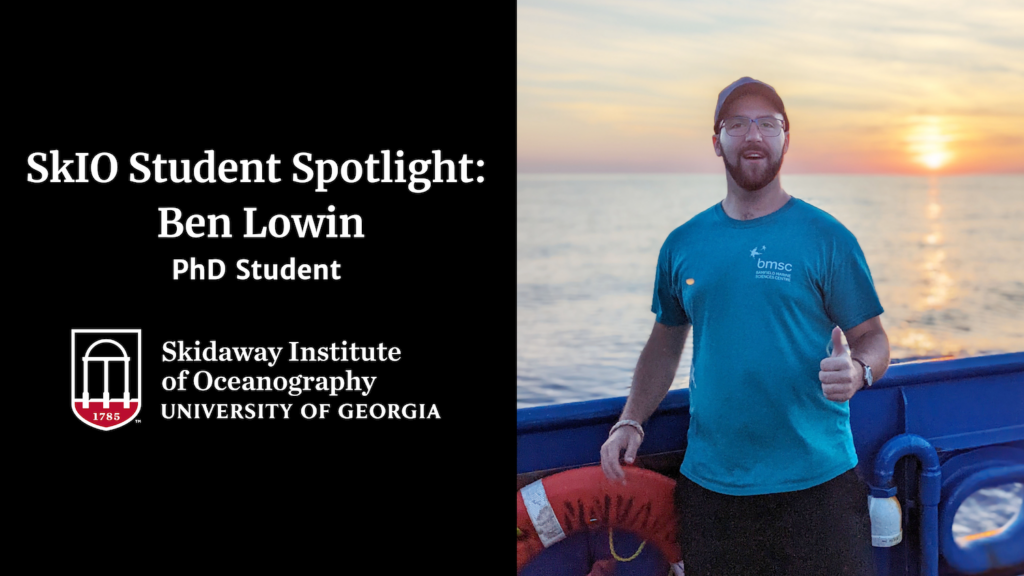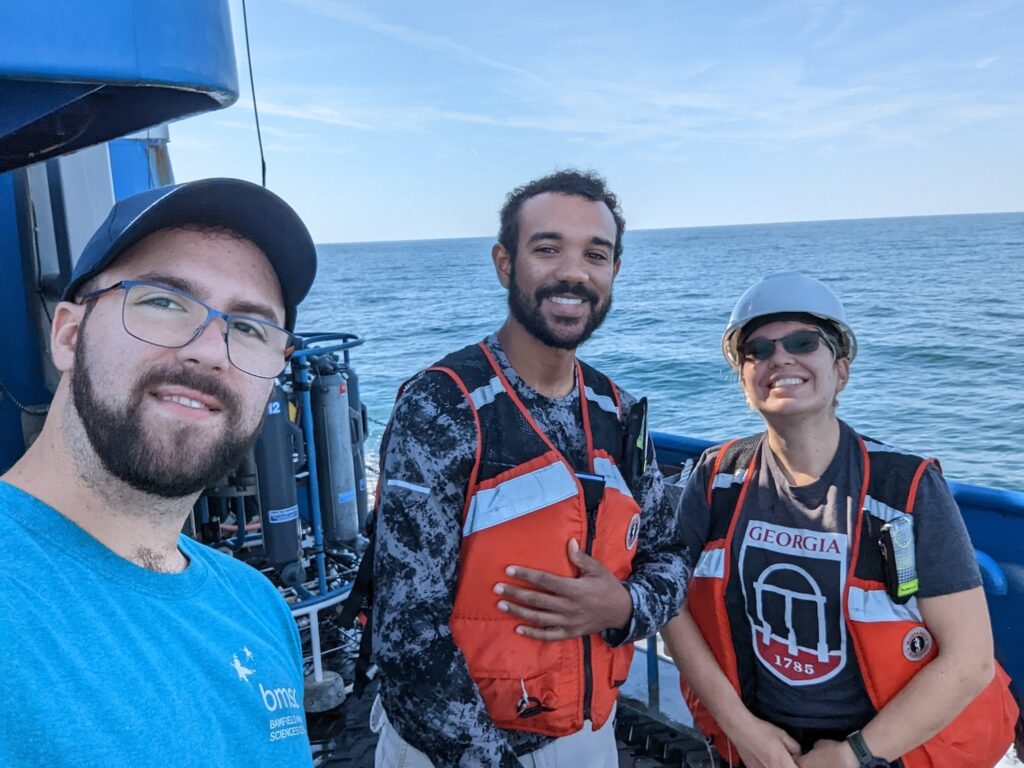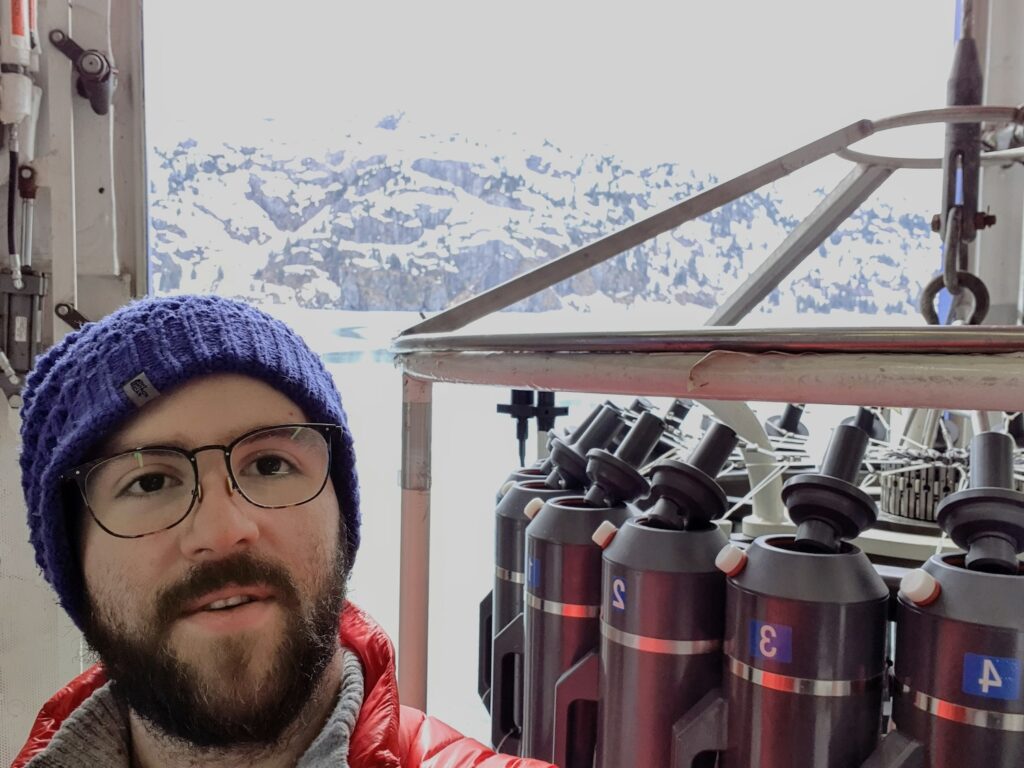
Ben Lowin, a San Francisco Bay Area native who grew up in Switzerland, is a doctoral student focusing on remote sensing in Sara Rivero-Calle’s lab at the University of Georgia Skidaway Institute of Oceanography (SkIO). Lowin received his bachelor’s degree at the University of British Columbia, in Vancouver, where he majored in biology and biological oceanography. Lowin then went on to earn his master’s degree at the University of Southampton, in England, specializing in remote sensing of the marine environment. His work at SkIO involves researching the impacts of climate change on the South Atlantic Bight’s ecosystem, particularly using satellite data to estimate oceanic net community production (NCP).
SkIO: What are you researching at SkIO, and who are you working with?
Ben Lowin (BL): At SkIO, I am working on developing a novel remote sensing algorithm to estimate oceanic NCP from satellite data. This project involves extensive data collection and analysis to understand the gradient in NCP going offshore in the South Atlantic Bight. I am collaborating with my advisor, Sara Rivero-Calle, and other researchers in the ocean biology and biogeochemistry and carbon cycle science fields.
SkIO: What inspired your love of oceanography and, more specifically, your track of study?
BL: My fascination with the ocean began during childhood vacations to the coast. The vastness and mystery of the ocean intrigued me. In college, a course on interdisciplinary oceanography solidified my interest, leading me to explore remote sensing as a tool to study large-scale oceanographic processes. The ability to analyze oceanic phenomena from satellite data was particularly captivating and aligned well with my interest in technology and environmental science.

SkIO: Why did you choose UGA/SkIO?
BL: I chose UGA/SkIO for the culture, Ph.D. project opportunity and access to facilities and equipment of an R1 university. SkIO has a sink-and-swim-together mentality. It’s a very friendly environment. I wanted to continue my work on bio-optics and remote sensing from Alaska, and Sara had a project that would allow me to continue to explore the field of remote sensing. Being able to go out on the R/V Savannah and work with cutting-edge instruments was a major drive for me.
SkIO: Describe a typical day in your life at SkIO.
BL: A typical day at SkIO starts with reviewing recent literature, followed by data processing and analysis using MATLAB and other tools. Afternoons often involve lab work or meetings with my research team to discuss findings and plan fieldwork. Some days are spent aboard the R/V Savannah or in the field collecting data. Evening are reserved for non-work activities.
SkIO: Where do you see yourself in five to 10 years?
BL: In five to 10 years, I envision myself as a leading researcher in the field of ocean remote sensing, possibly holding a faculty position at a research university or working with a government agency like NASA or NOAA. I aim to contribute significantly to our understanding of oceanic processes and climate change impacts, potentially developing new remote sensing technologies and methodologies.

SkIO: What do you do for fun, outside of your work/studies?
BL: Outside of my work, I enjoy playing Dungeons & Dragons, video games, reading and playing ultimate frisbee. I also have a keen interest in improving my skills in various areas, whether it’s through learning new board games or exploring different genres of literature.
SkIO: What advice would you give a high school or undergraduate student interested in a similar track? How can they get to where you are?
BL: My advice is to gain hands-on experience through internships or research projects. Field, lab and data analysis skills are very useful, but the bread and butter of my job is the dissemination of results via journal publications (writing). I encourage you to talk with your professors to see if they have opportunities in their labs or know of openings.


